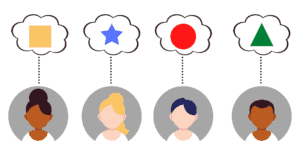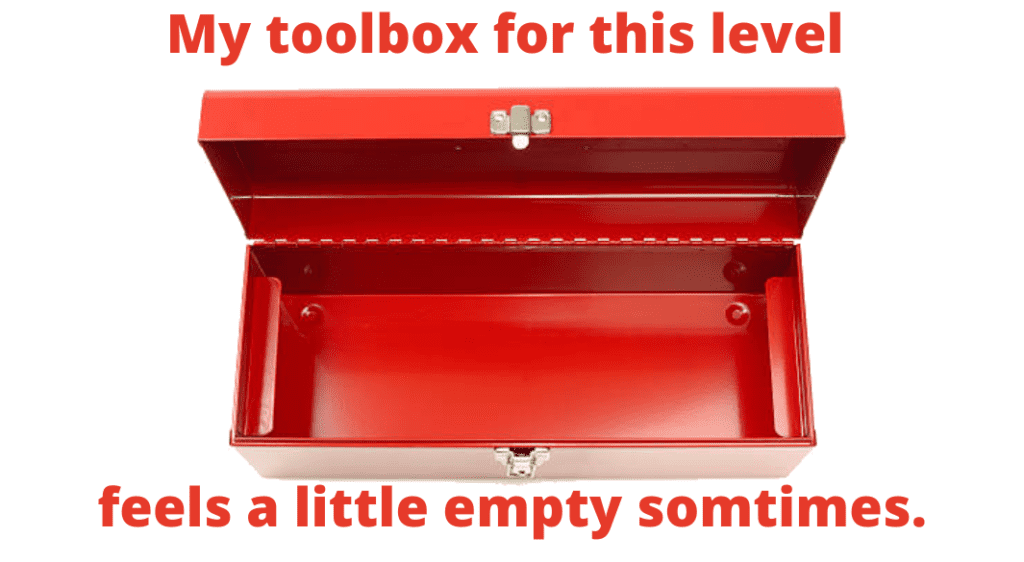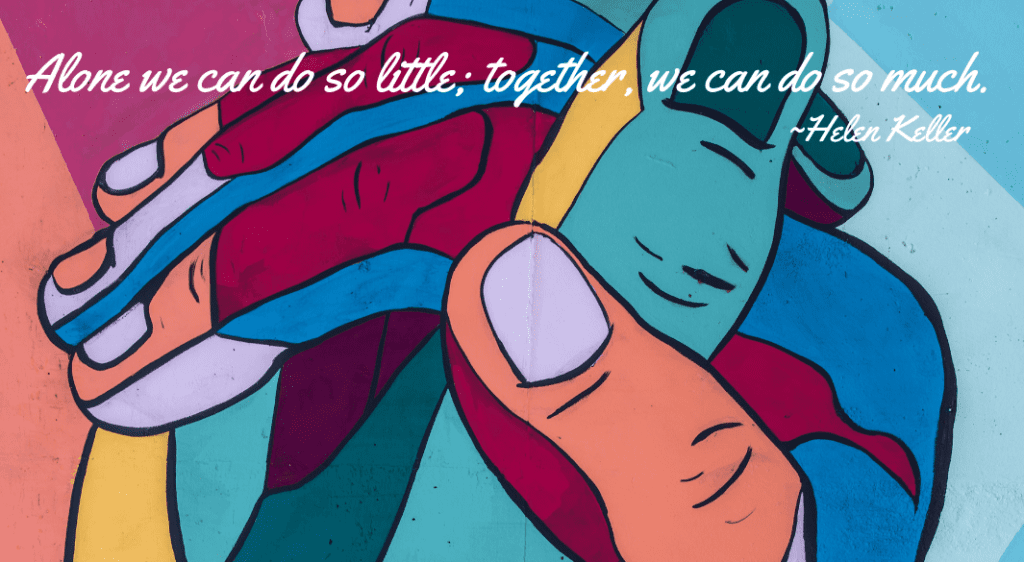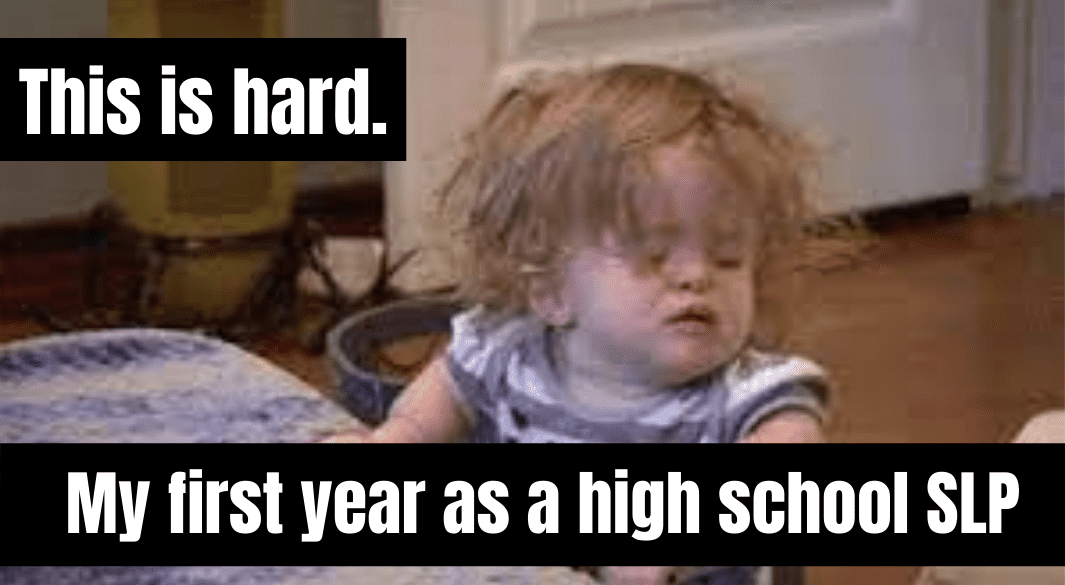I’m SLP-ing in a high school for the first time this school year.
I spent years working with high school students as a services coordinator and academic coach with Upward Bound. Loved it.
I studied the heck out of high school SLPing during graduate school – loved my Paul & Norbury’s “Language Disorders from Infancy through Adolescence” textbook.
As an SLP actually working in a high school? This it pretty new to me. And so far IT 👏 IS 👏 HARD 👏
So, rather than me sharing insight or reviewing a tool, this post is a bit of a laundry list of me whining (in a semi-professional tone) about the ways my job challenges me. Part of me was a little embarrassed at first to write about it; aren’t I supposed to be amazing at my job all the time?
In the end, I decided to write it because [1] there’s no shame in struggling, and [2] it might be therapeutic, and [3] maybe you’re struggling with the same things. And if you are, I want you to know you’re not alone!
Many, Very Different Hats
Ya know, those 5 minutes when you watch the coffee drip painstakingly slowly from the percolator while half-awake and secretly hoping for a snow day in August…? That’s my prep time at the beginning of the day. And I spend those few nanoseconds trying to reconcile parts of my job that seem vastly different to me.
With my Pre-K through 3rd grade students in years prior, most of them were working on similar things language wise: developing early morphosyntactic or semantic skills. Basically they were all in what Paul & Norbury call the “Emerging or “Developing Language” stages, and maybe a few were on the cusp of “Language for Learning.”
But my high school students? They’re the definition of disparate.

I’ve got students in 12th grade English learning to identify high-level rhetorical device, and next period I’m working with students who are still developing intentionality and prelinguistic foundations…and everything in between.
I enjoy working with all of my clients, and I always want to meet them at their level. But sometimes it can feel like developmental whiplash.
Because of this big variation in level, I have to be thinking constantly about different stages of developmental sequencing. And because I’m not a super genius who can hold it all in my head, I end up spending lots of time reviewing those various stages and milestones.
Many, Very Different Approaches
With these many hats come many different approaches to intervention:
- 1-on-1 habilitation
- Small group instruction
- Inclusion support
- Co-teaching an inclusion class
- Training assistants and aides (who are amazing btw and often time teach me more than I can teach them)
- Modifying curriculum
- Consulting with general education and special education providers
- Working with other support providers (Occupational Therapists, Social Workers, etc.)
- Monitoring students indirectly
Managing each of these approaches is exhausting because they all require different skills and types of planning.
Too Few Tools
One thing I struggle with at this level is finding tools that give me a lot of “mileage.”
I value low-prep tools I can learn once and use with multiple students to address multiple areas of need after simple adaptations.
In the elementary schools, if I had my Mr. Potato Head toy or a good book, I could prrrreeety much address any goal that might cross my path. Obviously certain students need highly individualized materials, but often times I could adapt and re-use materials throughout my day.
At the high school? Not so much.

I find myself designing activities, worksheets, books, and handouts that are completely unique and very finely tuned. Pre-designed materials are great when I can find them, but they’re usually costly and sometimes they might target the goal and be appropriate for the student’s language level, but not for their socio-emotional level (i.e., I can’t read Pete the Cat with my 11th graders even though it has perfect examples of the conjunctions we’re targeting).
Stuff That Has Helped So Far
Even though it is also one of the most exhausting parts of my job, one of the things I love about working as a Speech-Language Pathologist, is that it requires learning new things all the time.
In learning how to provide SLP services in a high school, here are some resources I’ve already found beneficial. To set fair expectations, none of these is a silver bullet, magic solution, or comprehensive approach. They’re all parts of the mosaic.
This post: “SLPs in Inclusive Classrooms: 9 Questions Answered!“
The post is a short one, but for me, it was a great jumping off point for the topic of SLPs in the inclusive classroom. It is based on information from a former professor of special education (Julie Causton, PhD) and an elementary school teacher turned PhD researching inclusive curriculum design (Chelsea Tracy-Bronson, PhD).
The post is sponsored by the publisher of the book that is used as the source, but it truly was a quick and valuable read.
Dr. Karen’s Blog and eBook
Some google searching on an unrelated topic led me to Dr. Karen’s blog which focuses on language interventions. She worked as an SLP before going on to earn her clinical doctorate (EdD) in special education.
The part I found most useful on Dr. Karen’s site so far was her free eBook / guide which promises the “answer to unexplained ‘processing’ problems.” Spoiler alert: Syntax. Syntax was something I had looked at closely in graduate school, and Dr. Karen’s guide and blog have been excellent refreshers on the topic.
Relying on my Team
When you’re working as an SLP, you can sometimes feel like you’re on an island all by yourself. At the high school level, there are so many other things going on in my students world that I can’t keep up alone. Literally, I can’t do it. So I’ve learned to rely on the others I work with.
The educational assistants working in a few of my classrooms are practically surrogate parents given how much time they spend with students, and they often have the most up-to-date information on what a student finds motivating. I’ve learned to depend on their expertise when I plan new interventions or to troubleshoot when something isn’t working.
One of the awesome things about my school district is that we employ an amazingly talented “Lead SLP,” whose job it is to coordinate and support SLPs throughout the district. On multiple occasions I’ve called her to check my clinical reasoning before writing a goal or simply to vent. I’ve also sought this same support from fellow SLPs in my district, though they tend to be a bit more busy.

We all know that parents and families are critical parts of an IEP and an individual’s care. But at the high school level, I’ve found this to be even more true. When a 4 year old in PreK is identified as needing SLP intervention, most caregivers all want the same thing: “just for them to talk and be understood.” With older students, we’re usually well beyond ‘just talking’ and in the thick of planning for post-secondary pursuits. My students and their post-high-school goals are incredibly diverse, and I have to trust in families (and the client themselves) to know where to focus our precious therapy time.
Going Back to Grad School
Ok I haven’t literally re-enrolled in graduate school. But I have gone back to my notes and books!
Paul & Norbury’s “Language Disorders from Infancy through Adolescence” is probably the textbook I reference the most. I’ve even set aside a little time in my schedule to re-read certain chapters and dig into the research cited in it.
The World Health Organization’s International Classification of Functioning (WHO ICF) is something that permeated all of my graduate coursework at the University of New Mexico. And, it is something I’ve come returned to frequently as I reflect on my work and if it is making a meaningful impact on my client’s lives.
Continuing Education Courses
While looking back on my education has been helpful, I’m also trying to look forward.
In that spirit, my district purchased a subscription for me to a popular continuing education provider. You know, one of those sites that has dozens of on-demand webinars and trainings. I haven’t completed any courses yet, so I don’t want to share the name. But when I do, I’ll be sure to post an honest review!
Final Thoughts
My job this year feels especially hard.
I wouldn’t say it is the hardest job I’ve ever done… but it is probably up there in the top three. I’m learning from the challenges. And I’m making changes to my practice. But it is still hard and will probably continue to be hard for a while.
And that’s okay, I guess.
In case things are hard for you too, I don’t want to end this post with some false-promise that XYZ will make it easier, a humble brag about how I’m ‘crushing it’ despite the challenges, or a toxically positive aphorism about silver linings.
Instead, all I can offer is a bit of solidarity and some space fo you to share your experience in the comments below.
Disclaimer reminder: Because of this post's topic, I think it is important that I reiterate what is shared in more detail here: Any opinions expressed here are my own and do not reflect those of my employers, universities, or affiliates (past, present, or future). Also, there are affiliate links in this post.

